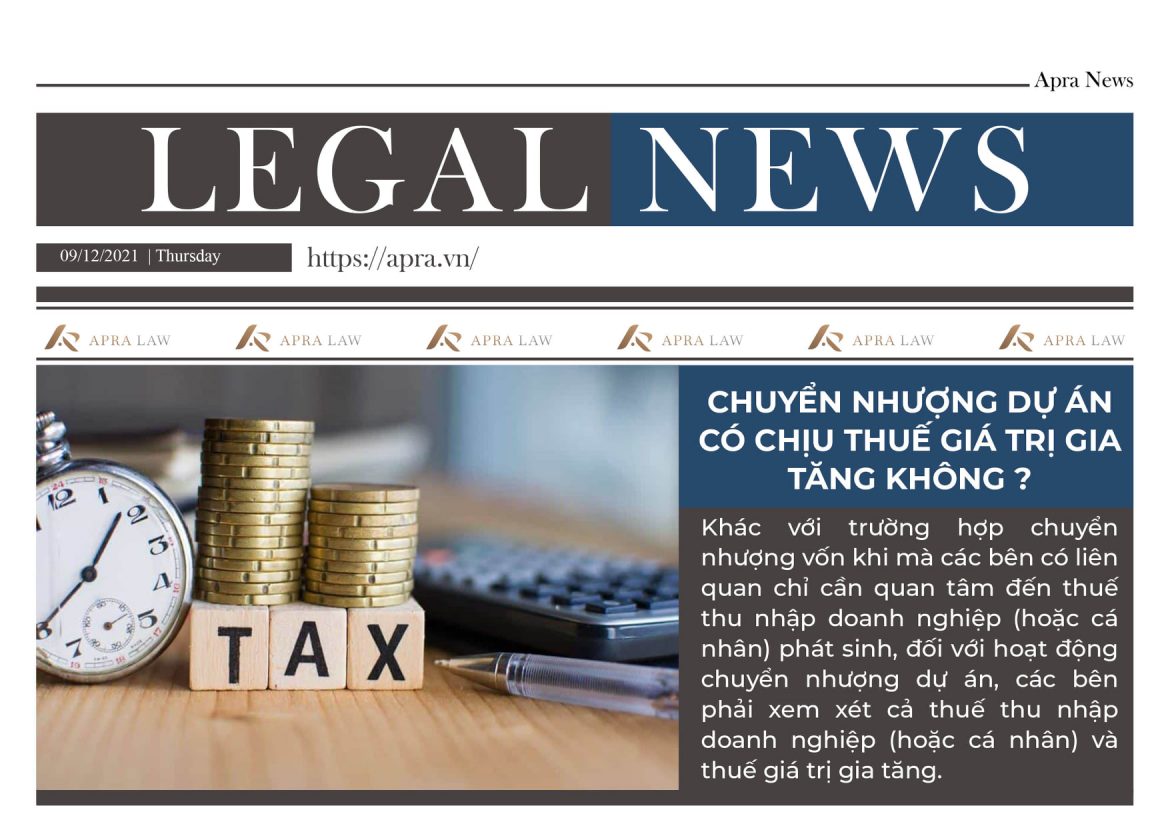When carrying out the transfer of an investment project, the transferor and the transferee need to be aware of a number of taxes applicable to this transaction, especially projects associated with real estate. Unlike the case of capital transfer where the related parties only need to pay attention to the corporate (or personal) income tax incurred, for the project transfer, the parties must consider corporate (or individual) income tax and also value added tax.
Normally, a value-added tax of 10% will be applied on the transfer price for each project transfer. However, according to the provisions of Clause 4, Article 5 of Circular 219/2013/TT-BCT, if the investment project is a project of production and trading of goods and services imposed value added tax, it is not applicable. In simple terms, if the “product” or “service” arising from an investment project incurs VAT, that “transfer of investment project” will not be imposed VAT and vice versa. This is to avoid taxing multiple times on the same revenue. Goods and services that are not subject to VAT are specified in Article 4 of Circular 219/2013/TT-BTC, amended and supplemented by Circular 26/2015/TT-BTC.
Example: Joint Stock Company P implements an investment project to build an industrial alcohol factory. By the end of March 2014, the investment project has completed 90% of the project design and the investment value is 26 billion VND. Due to financial difficulties, P Joint Stock Company decided to transfer the entire investment project to Joint Stock Company X with the transfer price of 28 billion VND. Joint Stock Company P is not required to declare and pay VAT on the value of the project transferred to Joint Stock Company X.
However, if the final product of a project has a part subject to VAT and a part not subject to VAT, how will VAT be calculated when transferring that project? For example, in the case of an investment project to build commercial houses for sale, according to current regulations, VAT will not be calculated on the value of land use rights. Accordingly, when selling commercial housing, the investor needs to separate the value of land use rights attached to the commercial house and the value of the commercial house itself to serve as a basis for calculating VAT for consumers. end users (residential buyers). Example: The total selling price of a commercial house is VND 10 billion, in which the value of the attached land use right is determined to be VND 6 billion, the home buyer only has to pay VAT for the remaining VND 4 billion. Thus, when the investor transfers this project to another investor, will the transferee not have to pay VAT because the output product of the project is a house subject to VAT; Or will the transferee not have to pay VAT on the part of the transfer price that is the value of the land use right, but will still have to pay VAT for the remaining value?
Normally, the transfer price of a project associated with land use rights will consist of two main components, including (i) the value of land use rights (usually accounts for a very large proportion / even the entire transfer price in many cases when the project is in the early stages of development) and (ii) the value of the property or other property rights attached to the project (for example, business and development to completed infrastructure, other assets, etc). With such separation of transfer price, it can be based on Articles 4.6 and Article 7.10 of Circular 219/2013/TT-BTC to determine that the value of land use rights in the transfer price will not subject to VAT. Obviously, to separate the transfer price among parts as the basis for determining VAT, businesses need to have appropriate accounting records and documents.
There is a view that because the output product of the project is a house attached to the land use right, in which the land use right is not subject to VAT, the transfer of the investment project must incur VAT on the value of land use rights according to the principle in Article 5.4 of Circular 219/2013/TT-BTC. However, this is totally inappropriate because in essence, only housing (invested and built) is the product of an investment project on housing construction, and the land use rights associated with housing are transferred through transactions without the need for influence to form.
_____________________
For more information, please contact:
APRA LAW FIRM
Address: 7th Floor, 57 Tran Quoc Toan, Tran Hung Dao Ward, Hoan Kiem District, Hanoi City, Vietnam.
Email: info@apra.vn
Hotline: 024.23486234 – 0948495885
